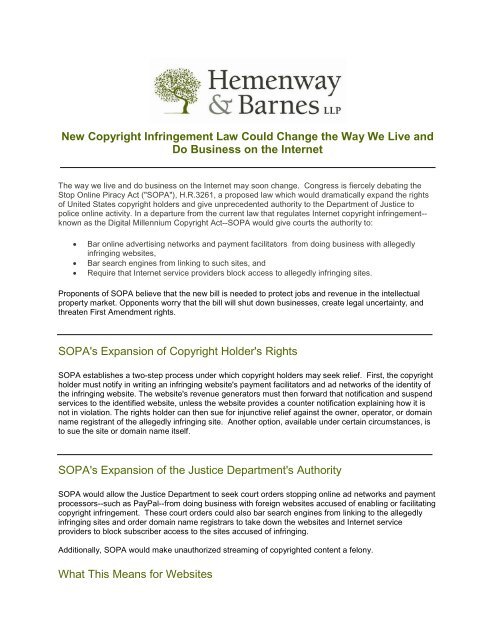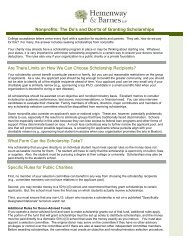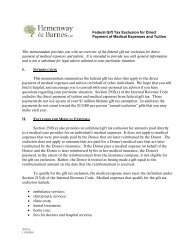New Copyright Infringement Law Could Change the Way We Live ...
New Copyright Infringement Law Could Change the Way We Live ...
New Copyright Infringement Law Could Change the Way We Live ...
Create successful ePaper yourself
Turn your PDF publications into a flip-book with our unique Google optimized e-Paper software.
<strong>New</strong> <strong>Copyright</strong> <strong>Infringement</strong> <strong>Law</strong> <strong>Could</strong> <strong>Change</strong> <strong>the</strong> <strong>Way</strong> <strong>We</strong> <strong>Live</strong> and<br />
Do Business on <strong>the</strong> Internet<br />
The way we live and do business on <strong>the</strong> Internet may soon change. Congress is fiercely debating <strong>the</strong><br />
Stop Online Piracy Act ("SOPA"), H.R.3261, a proposed law which would dramatically expand <strong>the</strong> rights<br />
of United States copyright holders and give unprecedented authority to <strong>the</strong> Department of Justice to<br />
police online activity. In a departure from <strong>the</strong> current law that regulates Internet copyright infringement--<br />
known as <strong>the</strong> Digital Millennium <strong>Copyright</strong> Act--SOPA would give courts <strong>the</strong> authority to:<br />
• Bar online advertising networks and payment facilitators from doing business with allegedly<br />
infringing websites,<br />
• Bar search engines from linking to such sites, and<br />
• Require that Internet service providers block access to allegedly infringing sites.<br />
Proponents of SOPA believe that <strong>the</strong> new bill is needed to protect jobs and revenue in <strong>the</strong> intellectual<br />
property market. Opponents worry that <strong>the</strong> bill will shut down businesses, create legal uncertainty, and<br />
threaten First Amendment rights.<br />
SOPA's Expansion of <strong>Copyright</strong> Holder's Rights<br />
SOPA establishes a two-step process under which copyright holders may seek relief. First, <strong>the</strong> copyright<br />
holder must notify in writing an infringing website's payment facilitators and ad networks of <strong>the</strong> identity of<br />
<strong>the</strong> infringing website. The website's revenue generators must <strong>the</strong>n forward that notification and suspend<br />
services to <strong>the</strong> identified website, unless <strong>the</strong> website provides a counter notification explaining how it is<br />
not in violation. The rights holder can <strong>the</strong>n sue for injunctive relief against <strong>the</strong> owner, operator, or domain<br />
name registrant of <strong>the</strong> allegedly infringing site. Ano<strong>the</strong>r option, available under certain circumstances, is<br />
to sue <strong>the</strong> site or domain name itself.<br />
SOPA's Expansion of <strong>the</strong> Justice Department's Authority<br />
SOPA would allow <strong>the</strong> Justice Department to seek court orders stopping online ad networks and payment<br />
processors--such as PayPal--from doing business with foreign websites accused of enabling or facilitating<br />
copyright infringement. These court orders could also bar search engines from linking to <strong>the</strong> allegedly<br />
infringing sites and order domain name registrars to take down <strong>the</strong> websites and Internet service<br />
providers to block subscriber access to <strong>the</strong> sites accused of infringing.<br />
Additionally, SOPA would make unauthorized streaming of copyrighted content a felony.<br />
What This Means for <strong>We</strong>bsites
Under <strong>the</strong> bill, any copyright holder who "knowingly and materially" misrepresents that a website is<br />
dedicated to infringement can be held liable for damages.<br />
Additionally, SOPA gives immunity to Internet services that voluntarily take action against websites<br />
dedicated to infringement. This creates a new duty for web services to self-police material posted on or<br />
linked to <strong>the</strong>ir sites, including material posted by website users.<br />
Critics of <strong>the</strong> bill believe that SOPA effectively overturns <strong>the</strong> Digital Millennium <strong>Copyright</strong> Act provision<br />
known as "safe harbor." This feature protects websites with potentially infringing material from liability if<br />
<strong>the</strong> websites promptly remove infringing material brought to <strong>the</strong>ir attention by a copyright holder's<br />
"Takedown Notice." Courts have generally held that under <strong>the</strong> Digital Millennium <strong>Copyright</strong> Act, websites<br />
are not liable for linked material.<br />
The Future of SOPA<br />
After two days of heated debate, <strong>the</strong> House Judiciary Committee adjourned its markup session on <strong>the</strong><br />
measure without a vote. The committee will resume <strong>the</strong> debate after Congress returns from its winter<br />
recess.<br />
If <strong>the</strong> committee votes to approve SOPA, <strong>the</strong> bill would <strong>the</strong>n move to <strong>the</strong> House floor for a vote. The<br />
Senate would also have to approve SOPA or similar legislation before <strong>the</strong> bill is sent to <strong>the</strong> President for<br />
his signature or veto.<br />
Getting Started<br />
Contact your Hemenway & Barnes attorney or <strong>the</strong> author of this advisory if you have questions.<br />
Elizabeth H. Small<br />
617-557-9730<br />
esmall@hembar.com<br />
<strong>Copyright</strong> © 2011 Hemenway & Barnes LLP<br />
This advisory is provided solely for information purposes and should not be construed as legal advice with<br />
respect to any particular situation. This advisory is not intended to create a lawyer-client relationship. You<br />
should consult your legal counsel regarding your situation and any specific legal questions you may<br />
have.




